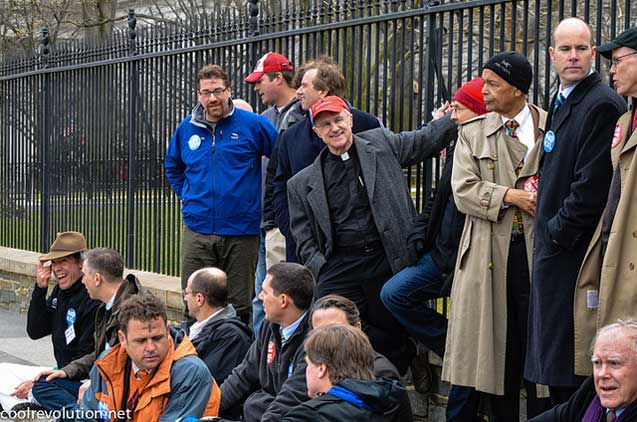
On February 13, 48 of the nation’s environmental and civil rights leaders got arrested in front of the White House to draw attention to climate change and the proposed Keystone XL Pipeline. Many dubbed the action “civil disobedience.” Four days later some 40,000 people followed with peaceful protest. Peaceful protest, a tactic utilized by the civil rights movement, has been introduced into the climate movement. A similar parallel, however, cannot be drawn between the action of the 48 leaders and the form of civil disobedience performed by the civil rights movement.
Civil disobedience is the conscious refusal to obey an unjust law. Rosa Parks performed this form of civil disobedience when she refused to give up her seat. She broke the unjust law that she wanted to change. The 48 leaders who want to change the laws that privilege
oil and gas corporations to extract, transport and sell North American fossil fuel were arrested for blocking a throughway in front of the White House.
The climate movement’s use of the stricter form of civil disobedience, when the unjust law is the one being broken, is still emerging. Rosa Parks was able to civilly disobey by simply refusing to stand. The body of law that privileges the fossil fuel industry is harder to break, but it can be, with precision.
Should an American community elevate its community right to democratically protect its health, safety and welfare above the legal privileges that permit corporate oil and gas extraction and transportation, the community would confront the body of law that the climate movement is trying to change. Such action would introduce novel rights into America’s legal structure, just as the civil rights movement did, and expose the fact that under current law exercising these rights is illegal.
This type of civil disobedience has been described as “collective, nonviolent, civil disobedience through local lawmaking” by Kai Huschke of the Community Environmental Legal Defense Fund, an organizer working to implement the concept in Spokane, Washington. The creation of these laws entails entire cities’ or communities’ defiance of the structure of law that privileges the fossil fuel industry. This might sound far-fetched, but it is not. Over 150 communities in eight states have already passed such a law.
Take Pittsburgh, Pennsylvania, for example. On November 16, 2010, the city passed an ordinance that asserts Pittsburgh citizens’ right to water, the inalienable and fundamental rights of natural ecosystems to exist and flourish within the city, and the city’s right to self-government. To protect these rights the ordinance removes legal powers from gas extraction corporations within the city. Just as was Rosa Parks’ refusal to stand, the ordinance is an illegal assertion of rights.
This “collective, nonviolent, civil disobedience” breaks the body of law that privileges corporations to extract, transport, and sell North American fossil fuel. Could this be a flavor of civil disobedience that the climate movement adds to its toolbox?
Pittsburgh is merely trying to protect its drinking water from the hydraulic fracturing (fracking) industry. In doing so it is exposing the unjust law that permits corporate fossil fuel extraction, which as Rosa Parks knows is the first step in changing said law.
Join us in defending the truth before it’s too late
The future of independent journalism is uncertain, and the consequences of losing it are too grave to ignore. To ensure Truthout remains safe, strong, and free, we need to raise $46,000 in the next 7 days. Every dollar raised goes directly toward the costs of producing news you can trust.
Please give what you can — because by supporting us with a tax-deductible donation, you’re not just preserving a source of news, you’re helping to safeguard what’s left of our democracy.